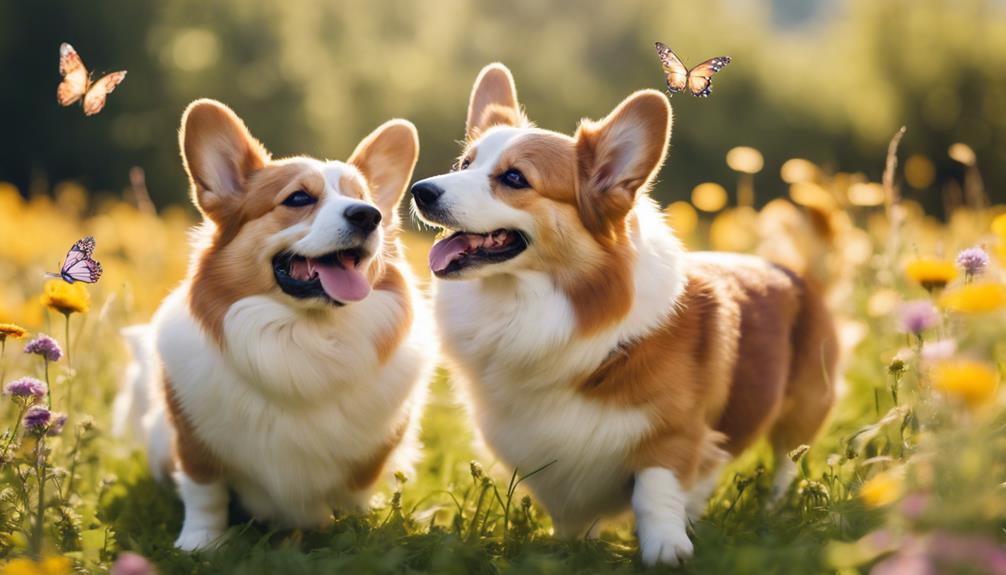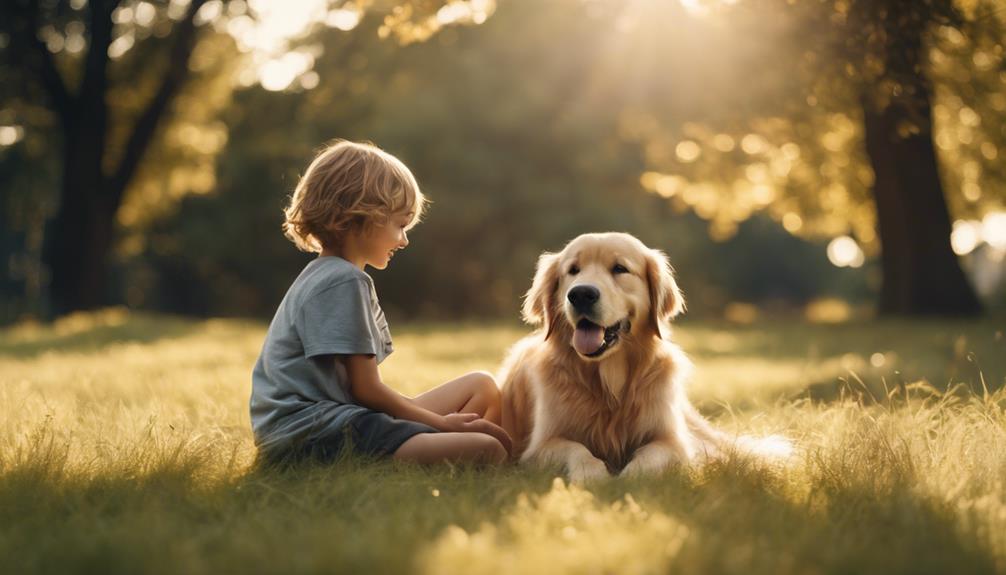The strong bonds that Corgis form with their owners can be attributed to a complex interplay of temperament, socialization, and innate behaviors. Their affectionate nature and loyalty, coupled with early social experiences, contribute to a profound connection that is often admired. Understanding the nuances of their attachment styles and the significance of consistent human interaction reveals much about these remarkable dogs. Yet, the question remains: what specific factors in their upbringing and environment truly enhance this bond, potentially reshaping our perceptions of canine companionship?
Understanding Corgi Temperament

Understanding the temperament of Corgis is essential for fostering a strong and harmonious relationship between these intelligent dogs and their owners. Corgis exhibit distinct personality traits that contribute to their unique appeal. They are known for their cheerful and affectionate nature, often forming deep bonds with their families. Additionally, Corgis possess strong herd instincts, which can manifest in behaviors such as nipping or chasing.
Key breed behavior patterns include:
- Playfulness, making them great companions.
- High intelligence, requiring mental stimulation.
Recognizing these traits can help owners provide appropriate training and socialization, ensuring a well-adjusted pet.
Ultimately, understanding Corgi temperament allows for a more fulfilling and rewarding partnership with these delightful dogs.
The Role of Socialization
Socialization plays a crucial role in a dog's development, significantly impacting their behavior and interactions with others.
Early exposure to various environments and experiences helps dogs build confidence and adaptability, while positive reinforcement techniques encourage desirable behaviors.
Additionally, engaging in group play fosters social skills and strengthens bonds between dogs and their human companions, promoting a well-adjusted pet.
Importance of Early Exposure
Early exposure to various environments, people, and other animals is crucial for a dog's development, significantly influencing their behavior and temperament throughout life.
Puppy experiences during the critical early months lay the foundation for social skills and adaptability. Positive environmental influences, such as meeting new people or encountering different animals, help puppies learn appropriate responses to various situations.
This exposure reduces fear and anxiety later in life, creating well-adjusted adult dogs. Key benefits of early socialization include improved confidence, reduced aggression, and enhanced bonding with humans.
It is essential for dog owners to prioritize these experiences, as they play a vital role in shaping a dog's character and ability to interact positively with the world around them.
Positive Reinforcement Techniques
Utilizing positive reinforcement techniques during socialization significantly enhances a dog's ability to learn desirable behaviors and develop strong bonds with both humans and other animals.
One effective method is clicker training, which uses a distinct sound to mark desired behaviors. This sound is immediately followed by a reward, reinforcing the behavior. Reward systems, such as treats or praise, encourage dogs to repeat these behaviors, making learning enjoyable.
Socialization can involve various experiences, from meeting new people to interacting with other dogs. When dogs associate these experiences with positive outcomes, they become more confident and well-adjusted.
Group Play Benefits
Participating in group play provides dogs with essential opportunities to develop social skills, learn appropriate behavior, and build confidence through interactions with their peers.
During these play sessions, dogs experience pack dynamics, mimicking the natural behaviors of a canine social structure. They engage in cooperative play, which fosters teamwork and communication among them.
This interaction allows dogs to establish relationships, learn to read body language, and understand social cues, all of which are vital for their emotional and behavioral development.
Furthermore, group play can reduce anxiety and improve overall well-being by creating a positive environment.
Ultimately, these social experiences are crucial for nurturing well-adjusted dogs that can thrive in various settings, both at home and in public.
Attachment Styles in Corgis

Corgis exhibit distinct attachment styles that reflect their unique personalities and social behaviors, significantly influencing their relationships with humans and other animals. Understanding these attachment behaviors is essential for fostering healthy interactions.
Here are four key attachment styles seen in corgis:
- Secure Attachment: These corgis feel safe and confident, often thriving in social situations.
- Anxious Attachment: Some corgis may become overly clingy, seeking constant reassurance from their owners.
- Avoidant Attachment: These corgis prefer independence and may shy away from close interactions.
- Ambivalent Attachment: Exhibiting mixed signals, these corgis alternate between seeking closeness and pushing away.
Recognizing these attachment styles can help owners better understand their corgi personality and support their emotional needs effectively.
Corgis and Human Interaction
Building strong connections with humans, corgis demonstrate exceptional social skills that enhance their interactions and deepen the bond with their owners.
Corgis excel in corgi communication, using a mix of vocalizations, body language, and facial expressions to convey their feelings. Their playful interactions, characterized by wagging tails and inviting barks, promote engagement and enjoyment during playtime.
Corgis are naturally curious and eager to explore their environment, which encourages active participation from their human companions. This interactive nature fosters mutual understanding and trust.
Furthermore, their affectionate demeanor allows them to connect on an emotional level, making them wonderful companions. Overall, the combination of effective communication and playful behavior strengthens the unique relationship between corgis and their owners.
Loyalty Traits of Corgis

Corgis are known for their natural affectionate nature, which plays a significant role in their loyalty to families.
This breed often forms strong connections with their human companions, eagerly participating in family activities and demonstrating protective behaviors.
Understanding these loyalty traits can help potential owners appreciate the unique bond they can develop with a Corgi.
Natural Affectionate Nature
Renowned for their natural affectionate nature, Corgis exemplify loyalty traits that endear them to families and individuals alike. Their cuddly instincts and affectionate behavior make them wonderful companions.
Here are four reasons why Corgis are celebrated for their loyalty:
- Emotional Bonding: Corgis thrive on human interaction, forming strong emotional connections with their owners.
- Protective Nature: They are known to be alert and protective, ensuring the safety of their loved ones.
- Playfulness: Their playful demeanor creates joyful experiences, strengthening bonds within the family.
- Intuitive Understanding: Corgis often sense their owners' feelings, providing comfort and support during tough times.
These traits contribute to their reputation as loyal and loving pets, making them cherished members of many households.
Strong Family Connection
The strong family connection that Corgis foster is a testament to their unwavering loyalty and affectionate nature, making them invaluable companions in any household.
These dogs thrive within family dynamics, often forming deep bonds with each member. Their keen sensitivity allows them to provide emotional support, recognizing when a family member is feeling down or stressed. Corgis often engage in protective behaviors, ensuring their loved ones feel safe and secure.
This loyalty not only enhances the family's overall emotional health but also promotes a sense of belonging. Additionally, their playful demeanor encourages interaction and strengthens relationships, making Corgis a cherished part of the family.
In essence, their loyalty contributes significantly to a harmonious family environment.
Factors Influencing Bonding
Several key factors play a crucial role in shaping the bond between dogs and their owners, including early socialization, consistent training, and the emotional environment in which they are raised. Understanding these influences can help enhance the relationship.
Genetic Predisposition: Certain breeds may naturally form stronger attachments.
Environmental Influences: A nurturing home environment fosters trust and security.
Early Socialization: Introducing dogs to various people and situations promotes adaptability.
Training Consistency: Regular training reinforces communication and understanding between dog and owner.
Together, these factors can significantly impact how deeply a dog bonds with its owner, highlighting the importance of both nature and nurture in this special relationship.

